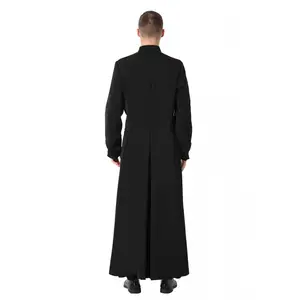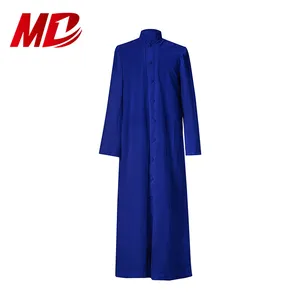(301 products available)




















































































































































































A clergy cassock is a long, robe-like garment worn by members of the clergy in various religious traditions, especially within Christianity. It is typically black and extends down to the ankles, often with a fitted waist and buttons down the front. The cassock serves as a symbol of the clerical vocation and is worn during worship services and other religious ceremonies. Here are some of its types:
Roman Catholic Cassocks
In the Roman Catholic Church, the clergy wear different cassocks depending on their rank. These are the following:
Sempiternal Black
This is the most common clergy cassock color and symbolizes humility and mourning. Most Catholic priests, deacons, and lay workers wear black cassocks. However, some religious orders wear colored cassocks.
Violet
The violet clergy cassock symbolizes penance and is worn during Lent and Advent. It is also used for funerals and other occasions that require mourning.
Red
Red is a symbol of blood and fire, so it is associated with martyrdom and the Holy Spirit. Bishops and Cardinals wear red cassocks, and they are also worn on Pentecost and Feast of the Martyrs.
Green
This color symbolizes hope and growth. It is the most commonly used color in the liturgy because it represents the Church's growth and life.
Rose
The rose color is a blend of violet and green, so it symbolizes a pause in the penitential seasons of Lent and Advent. It is worn on the third Sunday of Lent and the third Sunday of Advent.
White
White is the color of purity and joy and is worn during Easter, Christmas, and other celebrations that honor Jesus Christ and the Virgin Mary.
Black
This color is associated with death and is worn during funerals and other occasions that require mourning. It is also used to symbolize the end of something.
Anglican Cassocks
Anglican cassocks come in different colors, and each color has a specific meaning:
Black
Black is the most commonly worn Anglican cassock color, and it symbolizes humility and mourning. Most Anglican clergy wear black cassocks, and they are suitable for all occasions.
White
In the Anglican Church, white symbolizes purity and is worn during Easter, Christmas, and other celebrations that honor Jesus Christ and the Virgin Mary.
Red
Red is associated with the Holy Spirit and martyrdom, so it is worn on Pentecost and the Feast of Martyrs.
Green
Green represents hope and growth and is the color of the Church's life and growth.
Violet
Violet symbolizes penance and is worn during Lent and Advent.
Eastern Orthodox Cassocks
There are different types of Eastern Orthodox cassocks. They include the following:
Black
All ranks wear the black clergy cassock because it symbolizes humility. It is the most commonly worn color in Eastern Orthodox churches, and it is suitable for all occasions.
Colored Cassocks
Colored cassocks are worn by monks and some clergy. The color they wear depends on their monastic rank. For instance, black and white are the two colors commonly worn by monks. The black color symbolizes humility, while the white color symbolizes purity and simplicity.
Two-Toned Cassocks
Two-toned cassocks are worn by bishops and some clergy. For instance, a black and red cassock is worn by bishops. The black color symbolizes humility and the red color symbolizes authority.
Modern clergy cassocks are available in various designs and styles to meet the needs of different denominations and cultural traditions. Here are some key design elements to consider when looking for a modern clergy cassock:
Style and Cut
The clergy cassocks commonly vary in style and cut. Some have a close-fitting design with a straight silhouette, while others have a more relaxed fit. Some modern clergy cassocks feature a V-neck or round neck with buttons or a zip closure. Others may be open-front with a belt or tie closure at the waist. Some may also include side slits for ease of movement. The sleeves may be long or short, with cuffs that are fitted or loose. Others may have a layered design with an inner robe or additional vestments.
Fabric and Texture
When it comes to modern clergy cassocks, there is a wide variety of available fabrics to choose from. Some are made of natural fibers such as cotton, wool, or linen. Others are made of synthetic fibers such as polyester or rayon blends. The texture and weight of the fabric may also vary based on the season or occasion. For instance, summer clergy cassocks may be lighter and more breathable. On the other hand, winter clergy cassocks may be heavier and more insulated. The fabric's drape and finish can also affect the overall look and feel of the cassock.
Color and Symbolism
Modern clergy cassocks are available in various colors, each with its symbolism and significance. For instance, black clergy cassocks are commonly worn in most Christian denominations. They are a symbol of humility and simplicity. On the other hand, white clergy cassocks may be worn during festive or joyful occasions. They symbolize purity and peace. Other colors such as purple, red, or green may also be used. These colors are often associated with specific liturgical seasons or themes. They may also reflect the wearer's denomination or personal preference.
Details and Embellishments
Modern clergy cassocks are also different in style, and some may have details and embellishments. For example, some may have piping or trim along the seams or sleeves. Others may have embroidered or appliqued symbols such as crosses or doves. Buttons or toggles may also be part of the embellishments. Additionally, some clergy may prefer a plain and simple design. Others may prefer a more ornate and decorative style. The details and embellishments can add a personal touch and reflect the wearer's taste.
Matching a clergy cassock with other accessories is a creative process that will give the clergy a unique, formal, and traditional appearance. Here are some suggestions on how to wear and match a clergy cassock:
Monochrome Elegance
This clergy wears a black cassock, which is worn with a white collar for a sleek and elegant look. This style is suitable for formal occasions and church services. To achieve this look, wear a black cassock and pair it with a white collar shirt. This monochrome combination is very elegant and suitable for formal occasions.
Classic Contrast
This clergy wears a black cassock with a white surplice for a classic contrast look. This style is suitable for weddings, funerals, and other formal church services. To achieve this look, wear a black cassock and pair it with a white surplice. The black and white combination is very traditional and suitable for formal occasions.
Colorful Coordination
This style involves wearing a colored cassock and coloring the matching accessories and liturgical garments. It is ideal for special occasions such as feast days or church celebrations. To achieve this look, wear a purple cassock and pair it with a matching purple stole and prayer. The monochromatic color scheme looks coordinated and festive.
Casual Layering
This involves wearing a black cassock layered with a sweater or jacket. It is suitable for a casual church event or daily ministry work. To achieve this look, wear a black cassock and layer it with a gray sweater. The combination is casual but still polished.
Seasonal Styling
For summer, choose light fabrics like linen for the clergy attire, and for winter, opt for heavier fabrics like wool. This style is suitable for daily ministry work and church events. To achieve a summer look, wear a white linen cassock and pair it with sandals. For winter, wear a navy wool cassock and pair it with dress boots. The fabrics chosen are based on the season, keeping comfort in mind.
Liturgical Matching
This involves matching the cassock with liturgical colors corresponding to the church calendar. For example, a red cassock paired with a red stole and prayer for Pentecost. This style is suitable for all church services and special occasions. To achieve this look, choose the liturgical color of the day and coordinate the cassock with the stole and prayer. This ensures the clergy is in sync with the church calendar.
Q1: What is the cassock clergy?
A1: A cassock is a long, black robe worn by clergy members of different Christian denominations. It has a close-fitting design and extends to the ankles, incorporating a button-down front and long sleeves. The clergy launder the cassock, which is made of wool or another suitable fabric, and wears it during religious services and ceremonies, signifying their status and dedication to their faith.
Q2: Why do priests wear cassocks?
A2: Priests wear cassocks as liturgical garments that symbolize their spiritual authority and commitment. The long, flowing robe represents modesty and humility, suitable for one serving in a sacred capacity. Wearing a cassock creates an environment conducive to prayer and worship, helping priests focus on their divine duty.
Q3: Are cassocks worn outside of church?
A3: While cassocks are primarily associated with religious services, they are occasionally worn outside the church in formal or ceremonial events. Clergy members may wear cassocks during official functions, meetings, or public appearances. However, this is less common, and cassocks are mainly associated with liturgical settings.
Q4: What do different colors of cassocks mean?
A4: The color of a cassock can have different meanings depending on the Christian denomination and liturgical season. For example, black cassocks are worn in Catholic and some Protestant traditions, symbolizing humility and penance. Purple cassocks may be worn during Advent and Lent, signifying mourning and repentance, while white cassocks represent purity and holiness. Each color carries symbolic significance related to the church's teachings and the specific liturgical context.